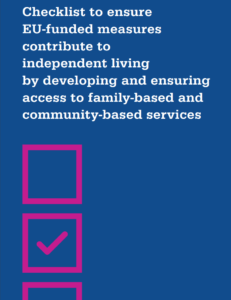The European Expert group on the Transition from Institutional to Community-based Care (EEG) and Hope and homes for children have published a new tool to ensure EU funds are used for inclusion.
The “Checklist to ensure EU-funded measures contribute to independent living by developing and ensuring access to family-based and community-based services” aims to ensure many more EU citizens benefit from EU funding for inclusion and to prevent the misuse of EU funds.
The purpose of this checklist is to ensure EU funds in the 2021-2027 programming period contribute to independent living and inclusion in the community. More specifically, the checklist supports desk officers to check the consistency of the measures with the legal and policy frameworks in the fields of:
- Transition from institutional to family-based and community-based services for children, persons with disabilities, persons with mental health problems and elderly persons
- Development of quality family-based and community-based services
- Prevention of separation of children, including with disabilities, from their families
- Prevention of segregation and institutionalisation of children, persons with disabilities, persons with mental health problems, older people and homeless people, regardless of their residence status
Inclusion Europe is member of the EEG.
Inclusion Europe’s Director Milan Šveřepa said :
We encourage our members to use the checklist during this important period of negotiations between the EU and members states about the future EU budget. The checklist can help communicate what types of actions and services are needed to support the inclusion of people with intellectual disabilities. The checklist also highlights actions and types of services that contribute to segregation and should not receive funding.
Read more about Inclusion Europe’s work on inclusion in the community. And also about deinstitutionalisation and children with disabilities.






